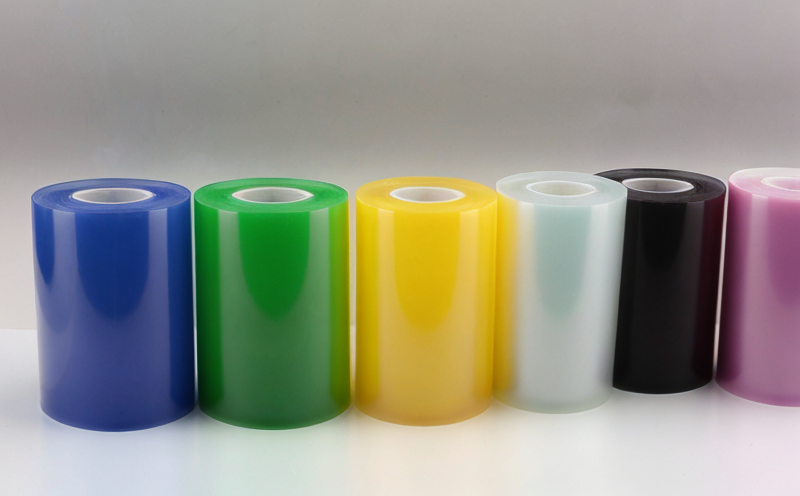EN ISO 22007-2 Thermal Diffusivity Testing of Plastic Films
The thermal diffusivity testing method described in CEN standard EN ISO 22007-2 is essential for the characterization and quality assurance of plastic films. This testing procedure evaluates how efficiently a material can transfer heat through it, which is critical in applications like packaging, insulation, and consumer products.
The thermal diffusivity (α) is defined as the ratio between the volumetric rate of heat flow density per unit temperature gradient to the temperature gradient itself. In simpler terms, it measures how quickly a material can spread heat throughout its volume. For plastic films, this property can significantly impact their performance in various environments.
Understanding thermal diffusivity is particularly important for quality managers and compliance officers who must ensure that products meet regulatory requirements. It also plays a crucial role in the research and development (R&D) of new materials, helping engineers refine product designs to optimize heat management. Similarly, procurement teams can use this information when selecting suppliers.
The EN ISO 22007-2 standard provides standardized procedures for measuring thermal diffusivity using various techniques. One common method involves the measurement of temperature changes in a controlled environment after applying a known heat source. This allows for accurate and repeatable results across different laboratories, ensuring consistency and reliability.
The testing procedure requires careful preparation of specimens to ensure accurate measurements. Specimens are typically cut from larger sheets or rolls of plastic films into standard dimensions. The chosen thicknesses must be consistent with the intended application. Preparing these samples correctly is crucial as it directly affects the results obtained during thermal diffusivity testing.
Once prepared, the specimens undergo precise measurement and placement within a specially designed apparatus used for conducting thermal diffusivity tests according to EN ISO 22007-2. The test setup ensures minimal heat loss from the sample, maintaining controlled conditions that influence the accuracy of results.
The testing process itself involves applying a known amount of heat to the specimen and measuring the resulting temperature changes over time. This data is then used to calculate thermal diffusivity according to established formulas provided in EN ISO 22007-2.
After completing all necessary measurements, analysts compile and analyze the collected data to generate detailed reports outlining the thermal properties of each tested specimen. These comprehensive documents serve as valuable tools for quality control teams and R&D departments alike, guiding further improvements or adjustments needed in product development cycles.
The importance of accurate thermal diffusivity testing cannot be overstated. It ensures that plastic films perform optimally under diverse environmental conditions while maintaining safety standards set forth by relevant authorities worldwide. By adhering to EN ISO 22007-2, laboratories maintain credibility and reliability in their analytical services.
Why It Matters
The measurement of thermal diffusivity through EN ISO 22007-2 is vital for several reasons. Firstly, it helps ensure that plastic films used in packaging meet the necessary safety standards and perform reliably under various temperature conditions. This property affects how well the film insulates or protects contents from external heat sources.
For manufacturers of consumer goods, understanding thermal diffusivity aids in creating products with improved energy efficiency by minimizing unnecessary heat transfer between components. In industrial applications such as construction materials or automotive parts, optimizing heat management can lead to longer product lifetimes and reduced maintenance costs.
In addition to enhancing performance characteristics, accurate thermal diffusivity data supports compliance efforts by providing reliable evidence of adherence to international standards like EN ISO 22007-2. This standardization promotes confidence among stakeholders about the quality assurance measures taken during production processes.
Moreover, R&D teams benefit greatly from this information as they can use it to innovate and develop new formulations that enhance thermal performance further. The ability to predict how changes in chemical composition or manufacturing methods will alter a material's thermal behavior is invaluable for advancing technological progress.
The insights gained from EN ISO 22007-2 testing extend beyond immediate product improvements; they contribute significantly towards broader sustainability goals by promoting more efficient use of resources and reducing environmental impacts associated with improper waste disposal practices.
Scope and Methodology
| Test Parameter | Description |
|---|---|
| Temperature Range | The test must be conducted within a specified temperature range to ensure accurate measurements. |
| Heat Source | A controlled heat source is applied uniformly across the specimen surface. |
| Measurement Instrumentation | Advanced sensors and data acquisition systems record temperature changes over time. |
| Data Analysis | Collected data undergoes rigorous analysis using mathematical models defined in EN ISO 22007-2. |
| Specimen Preparation | Description |
|---|---|
| Samples Size | Standardized dimensions ensure consistent testing conditions throughout the laboratory. |
| Thickness Consistency | Ensuring uniform thickness minimizes variability in thermal diffusivity measurements. |
| Cleanliness | Specimens must be free from dirt, dust, or other contaminants that could affect results. |
| Storage Conditions | Proper storage prevents degradation of the specimen before testing begins. |
The scope and methodology outlined in EN ISO 22007-2 provide a framework for conducting reliable thermal diffusivity tests. By adhering strictly to these guidelines, laboratories can produce consistent results that are both accurate and reproducible. This standardization fosters trust among clients who rely on these findings for making informed decisions regarding product development or procurement.
Eurolab Advantages
EuroLab offers unparalleled expertise in performing thermal diffusivity tests according to EN ISO 22007-2. Our state-of-the-art facilities and experienced technicians guarantee precision and accuracy, ensuring that every test conducted meets or exceeds international standards.
We employ cutting-edge equipment designed specifically for measuring thermal properties of materials like plastic films. This advanced technology allows us to capture detailed temperature profiles with high resolution, providing more precise data points than traditional methods.
Our commitment to quality extends beyond technical capabilities; we also prioritize customer satisfaction by offering fast turnaround times and clear communication throughout the testing process. Whether you need single tests or ongoing support for your R&D projects, EuroLab is here to meet all your needs efficiently and effectively.





